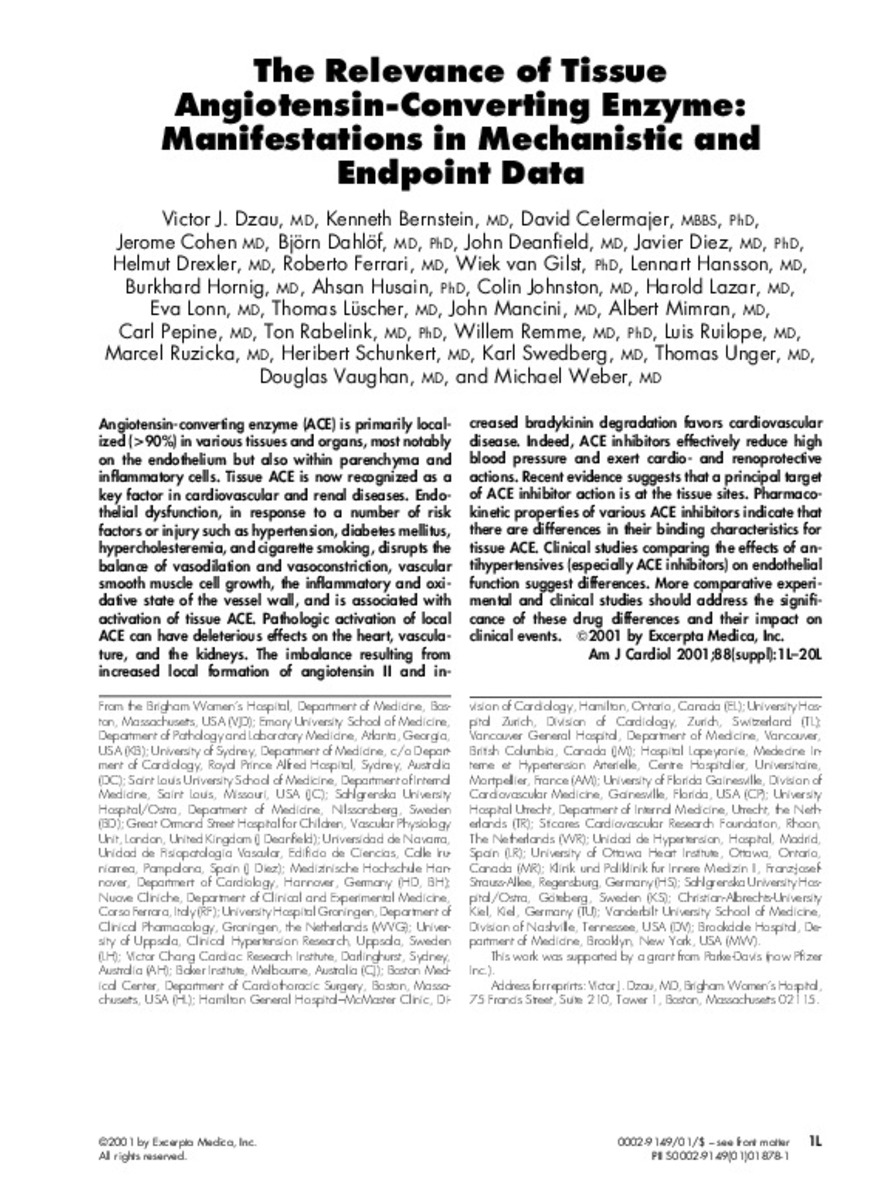Full metadata record
| DC Field | Value | Language |
|---|---|---|
| dc.creator | Dzau, V.J. (Victor J.) | - |
| dc.creator | Bernstein, K. (Kenneth) | - |
| dc.creator | Celermajer, D. (David) | - |
| dc.creator | Cohen, J. (Jerome) | - |
| dc.creator | Dahlöf, B. (Björn) | - |
| dc.creator | Deanfield, J. (John) | - |
| dc.creator | Diez-Martinez, J. (Javier) | - |
| dc.creator | Drexler, H. (Helmut) | - |
| dc.creator | Ferrari, R. (Roberto) | - |
| dc.creator | Gilst, W. (Wiek) van | - |
| dc.creator | Hansson, L. (Lennart) | - |
| dc.creator | Hornig, B. (Burkhard) | - |
| dc.creator | Husain, A. (Ahsan) | - |
| dc.creator | Johnston, C. (Colin) | - |
| dc.creator | Lazar, H. (Harold) | - |
| dc.creator | Lonn, E. (Eva) | - |
| dc.creator | Lüscher, T. (Thomas) | - |
| dc.creator | Mancini, J. (John) | - |
| dc.creator | Mimran, A. (Albert) | - |
| dc.creator | Pepine, C. (Carl) | - |
| dc.creator | Rabelink, T. (Ton) | - |
| dc.creator | Remme, W. (Willem) | - |
| dc.creator | Ruilope, L.M. (Luis M.) | - |
| dc.creator | Ruzicka, M. (Marcel) | - |
| dc.creator | Schunkert, H. (Heribert) | - |
| dc.creator | Swedberg, K. (Karl) | - |
| dc.creator | Unger, T. (Thomas) | - |
| dc.creator | Vaughan, D. (Douglas) | - |
| dc.creator | Weber, M. (Michael) | - |
| dc.date.accessioned | 2012-05-05T16:52:24Z | - |
| dc.date.available | 2012-05-05T16:52:24Z | - |
| dc.date.issued | 2001 | - |
| dc.identifier.citation | Dzau VJ, Bernstein K, Celermajer D, Cohen J, Dahlof B, Deanfield J, et al. The relevance of tissue angiotensin-converting enzyme: manifestations in mechanistic and endpoint data. Am J Cardiol 2001 Nov 8;88(9A):1L-20L. | es_ES |
| dc.identifier.issn | 1879-1913 | - |
| dc.identifier.uri | https://hdl.handle.net/10171/21895 | - |
| dc.description.abstract | Angiotensin-converting enzyme (ACE) is primarily localized (>90%) in various tissues and organs, most notably on the endothelium but also within parenchyma and inflammatory cells. Tissue ACE is now recognized as a key factor in cardiovascular and renal diseases. Endothelial dysfunction, in response to a number of risk factors or injury such as hypertension, diabetes mellitus, hypercholesteremia, and cigarette smoking, disrupts the balance of vasodilation and vasoconstriction, vascular smooth muscle cell growth, the inflammatory and oxidative state of the vessel wall, and is associated with activation of tissue ACE. Pathologic activation of local ACE can have deleterious effects on the heart, vasculature, and the kidneys. The imbalance resulting from increased local formation of angiotensin II and increased bradykinin degradation favors cardiovascular disease. Indeed, ACE inhibitors effectively reduce high blood pressure and exert cardio- and renoprotective actions. Recent evidence suggests that a principal target of ACE inhibitor action is at the tissue sites. Pharmacokinetic properties of various ACE inhibitors indicate that there are differences in their binding characteristics for tissue ACE. Clinical studies comparing the effects of antihypertensives (especially ACE inhibitors) on endothelial function suggest differences. More comparative experimental and clinical studies should address the significance of these drug differences and their impact on clinical events. | es_ES |
| dc.language.iso | eng | es_ES |
| dc.publisher | Elsevier | es_ES |
| dc.rights | info:eu-repo/semantics/openAccess | es_ES |
| dc.subject | Peptidyl-Dipeptidase A/physiology | es_ES |
| dc.title | The relevance of tissue angiotensin-converting enzyme: manifestations in mechanistic and endpoint data | es_ES |
| dc.type | info:eu-repo/semantics/article | es_ES |
| dc.relation.publisherversion | http://www.sciencedirect.com/science/article/pii/S0002914901018781 | es_ES |
| dc.type.driver | info:eu-repo/semantics/article | es_ES |
Files in This Item:
Statistics and impact
Items in Dadun are protected by copyright, with all rights reserved, unless otherwise indicated.






